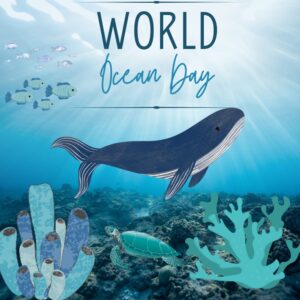World Ocean Day 2024: Awaken New Depths

Introduction
World Ocean Day, celebrated annually on June 8th, is a global event dedicated to honoring the ocean’s critical role in sustaining life on Earth. This day fosters worldwide awareness and action towards preserving our oceans. In 2024, the theme “Awaken New Depths” invites us to explore and understand the mysteries of the deep sea, emphasizing the importance of protecting these largely uncharted territories.
Understanding the Theme: Awaken New Depths
The theme “Awaken New Depths” encompasses both a literal and metaphorical journey into the ocean’s unexplored regions. It calls for a deeper appreciation of the underwater world, urging us to uncover the hidden wonders and address the challenges faced by these ecosystems. This theme highlights the need for scientific exploration, technological innovation, and global cooperation to protect and sustain our oceans.
The Importance of the Oceans
Oceans cover over 70% of the Earth’s surface and are vital to life on our planet. They regulate climate, produce more than half of the world’s oxygen, and are a significant source of food and livelihood for billions of people. Oceans are home to diverse ecosystems, including coral reefs, mangroves, and deep-sea trenches, each playing a crucial role in maintaining the planet’s health.
Current Challenges Facing the Oceans
Despite their importance, oceans face numerous threats, including:
Pollution: Plastic waste, oil spills, and toxic chemicals pollute marine environments, harming wildlife and ecosystems.
Climate Change: Rising temperatures, ocean acidification, and sea-level rise disrupt marine life and habitats.
Overfishing: Unsustainable fishing practices deplete fish populations and damage marine ecosystems.
Habitat Destruction: Coastal development, bottom trawling, and coral mining destroy critical habitats.
Biodiversity Loss: Species extinction and the decline of marine populations threaten the balance of ocean ecosystems.
Exploring and Protecting the Deep Sea
The deep sea, often referred to as the “final frontier” of exploration, remains largely uncharted and holds many secrets. These depths are home to unique species and ecosystems, many of which are still undiscovered. To awaken new depths, we must invest in scientific research and innovative technologies that allow us to explore and understand these remote areas.
Scientific Exploration
Scientific expeditions to the deep sea have already yielded fascinating discoveries, from bioluminescent organisms to hydrothermal vents teeming with life. Understanding these ecosystems is crucial for several reasons:
Biodiversity: Documenting and studying deep-sea species can provide insights into evolution, adaptation, and resilience.
Medical Research: Many deep-sea organisms possess unique properties that could lead to medical breakthroughs.
Climate Regulation: Deep-sea ecosystems play a role in carbon sequestration and nutrient cycling, impacting global climate patterns.
Technological Innovation
Advancements in technology are essential for deep-sea exploration and conservation. Innovations include:
Submersibles and ROVs: Remotely operated vehicles (ROVs) and manned submersibles allow scientists to explore deep-sea environments safely and efficiently.
Mapping Technologies: High-resolution sonar and satellite imaging enable detailed mapping of the ocean floor, revealing hidden features and habitats.
Data Collection: Autonomous sensors and underwater drones gather valuable data on ocean conditions, helping to monitor changes and identify threats.
Global Cooperation for Ocean Conservation
Addressing the challenges faced by our oceans requires collective action and international collaboration. Governments, organizations, and individuals must work together to implement effective conservation strategies and policies.
Marine Protected Areas (MPAs)
Expanding and effectively managing Marine Protected Areas (MPAs) is critical for conserving marine biodiversity and habitats. MPAs provide safe havens for endangered species, protect spawning grounds, and allow ecosystems to recover from human impacts.
Sustainable Practices
Promoting sustainable fishing, reducing plastic pollution, and minimizing carbon footprints are essential steps toward preserving ocean health. Industries, communities, and individuals can contribute by adopting eco-friendly practices and supporting conservation initiatives.
Education and Awareness
Raising awareness about the importance of the oceans and the threats they face is crucial for fostering a sense of responsibility and inspiring action. Educational programs, media campaigns, and community engagement can help spread knowledge and encourage conservation efforts.
Celebrating World Ocean Day 2024
World Ocean Day 2024 offers a unique opportunity to celebrate and honor our oceans while promoting their conservation. Here are some ways to get involved:
Participate in Events: Join local and global events such as beach clean-ups, educational workshops, and conservation projects.
Support Research: Contribute to organizations and initiatives focused on marine research and exploration.
Raise Awareness: Use social media and other platforms to share information about ocean conservation and the importance of protecting marine environments.
Adopt Sustainable Practices: Reduce plastic use, choose sustainable seafood, and minimize your carbon footprint to help protect the oceans.
Conclusion
World Ocean Day 2024’s theme, “Awaken New Depths,” calls us to delve deeper into the mysteries of the ocean and to take action to protect these vital ecosystems. By embracing scientific exploration, technological innovation, and global cooperation, we can safeguard the health of our oceans for future generations. Let us use this day as a reminder of our shared responsibility to cherish and preserve the blue heart of our planet.
SAVE OCEANS

Thank you for this wonderful blogs.